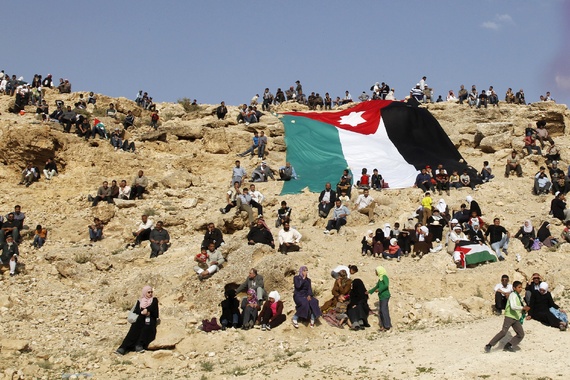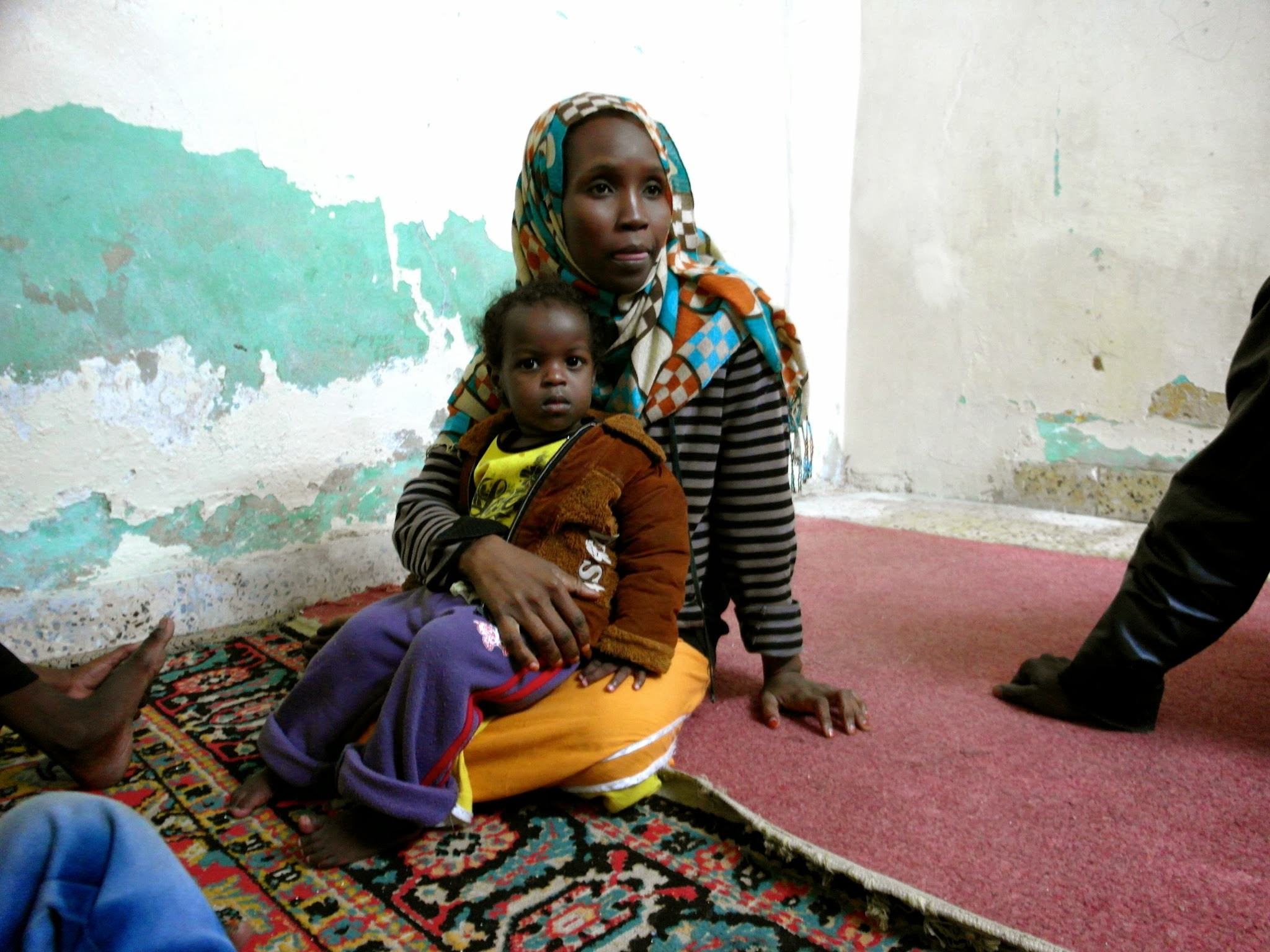
When the adhan sounds, a sigh of relief ripples across the room. The call to prayer marks the end of the day's Ramadan fasting and the go-ahead for seven disabled children, six volunteers, one grandmother, and two supervisors, all from Syria, to dig into the mountain of McDonald's in front of them.
Souad, the grandmother, is in a wheelchair next to me. At 72 years old, she's the only adult patient in this place, a physical rehabilitation center for Syrian refugee amputees.
"Sahateen," I smile at Souad, trying to get her to eat. She pulls the corners of her mouth taut, looking down at the tray balanced across her knees, just above where the rest of her legs used to be.
"Last year I had Ramadan with my grandsons," Souad says, picking at a piece of lettuce peeled from inside her Big Mac. "They were the same age as these children." Across the room, five-year-old Hammoudeh yelps at a girl flicking date pits at him. "I had two daughters and three grandsons," Souad says. "We were trying to get back to Damascus when the bomb hit our car." She rips the lettuce into little pieces, dropping them back onto the tray. "I don't know why they didn't get out. Why am I here? Why did I survive alone?"
***
Jordan has a reputation for being the Middle East's island of peace. Geopolitically, it is—amid ISIS's spread across Iraq, Syria's devastation, and the escalating Israeli-Palestinian conflict, the Hashemite Kingdom feels quiet. Crises don't happen in Jordan, the narrative goes—that's why it's home to more than a million refugees.
Every few weeks, a fresh bout of violence afflicts the Levant, and media attention flits to Jordan. What if Jordan falls next? Could extremists take control of the country? Then the moment passes and the speculation subsides.
But people like Souad, who fled from destruction just a few hours' drive in any direction from Amman, are well aware that a crisis doesn't end when its victims cross a border. It just shifts shape, the loud onslaught of extremists and rockets giving way to a muted, daily fight against despair.
Jordan's real crisis is not the threat of encroaching extremism, but the grinding weight of hosting victims from the region's various humanitarian emergencies. The technical name for this is a "protracted refugee crisis"—a burden that Jordan uniquely bears as host to more than a million refugees and asylum seekers from surrounding conflicts, according to government numbers. Since 2011, Jordan's 6.3 million people have taken on roughly an additional 600,000 Syrians, who join about 29,000 Iraqis and some 4,000 refugees from Sudan, Somalia, and other countries, along with thousands more who remain unregistered with UNHCR, the U.N. refugee agency. If this were the United States, it would be as if Canada's entire population moved in virtually at once.
"The international humanitarian system is really under unprecedented strain at the moment," says Jeff Crisp, a former UNHCR official who now works at Refugees International. He lists the past year's blitz of crises: the Philippines, the Central African Republic, South Sudan, Syria. "Just a few weeks ago we said if we had one new major emergency, the system wouldn't be able to cope—and now we've got Iraq."
From a humanitarian perspective, the refugee crisis is one of survival. From a human perspective, it's one of purpose. Refugees in Jordan are protected by UNHCR's mandate, which means they can exist without fear of non-refoulement, or being sent back to their conflict-torn countries. They also get access to food, water, shelter, and basic medical services, at least in the camps. But what happens when immediate relief morphs into long-term sustenance, spilling out of the camps and into the cities?
"People, even as refugees, still want and need to have some agency over how they cope and manage their lives," says Dawn Chatty, director of the Refugee Studies Center at Oxford University. That's why most don't linger long in refugee camps. Syrians crossing the border are immediately registered and brought to either the Zaatari or Azraq camp. But more than 80 percent of Syrians then leave, moving to urban areas along with non-Syrian refugees.
Outside the camps, Syrians receive a set monthly amount in food coupons and access to free primary health care. Non-Syrians get medical subsidies and are evaluated on a case-by-case basis for other assistance. No one is allowed to work, but they do anyway, risking detention to make informal incomes. Walking around Amman, you see Syrians manning coffee stands, Iraqis working in restaurants, and Sudanese in construction uniforms. Former engineers and lawyers wash cars and sweep streets—on days when they're lucky enough to get hired. The strain of refugee existence isn't just that your life and home were destroyed by war, but also that after that, you're forced into indefinite victimhood. Suddenly you are and must remain passive, dependent—your hands tied no matter how capable they are.
"My working hours are 10 p.m. to 4 a.m.," one Sudanese man told me in perfect English, shushing the 3-year-old daughter climbing on his back. He used to teach comparative literature in Khartoum, but now takes a nightly bus to his shift as a janitor at a mall in western Amman.
Still, 90 percent of Syrian refugees in Jordan are in debt. More than half are children, who can legally attend Jordanian schools but rarely do. Instead, they work, often more than 12 hours a day in jobs like scrap-metal collection or construction. More than one in four Syrian refugee women in Jordan, Lebanon, Iraq and Egypt head households alone, struggling to pay rent while suffering anxiety, isolation, and fear of both sexual violence and the stigmas of reporting it. Meanwhile, rates of child marriage among Syrians in Jordan have more than doubled since the start of the conflict, as desperate families marry off teenage daughters to fend off poverty and risk of rape.
A year passes, then two, then three. Rents rise—up to 300 percent in some areas—along with gas, electricity, and water bills. The Jordanian economy, already destabilized by disrupted trade and transit routes across the region, wobbles. GDP growth declines. Foreign direct investment shrivels. Budget deficits and public debt grow.
Jordan's government has drafted a National Resilience Plan to mitigate this kind of damage for its citizens, 14 percent of whom live below the national poverty line. But the plan, along with all the humanitarian work in the country, depends on international funding, which is dwindling. To date, UNHCR has received 33 percent of its 2014 regional appeal for the Syrian crisis, leaving a gap of nearly $2.5 billion.
Jordan is not meant to be a host country indefinitely. Refugees are supposed to stop here for relief until they reach a "durable solution"—meaning returning home or resettling somewhere with permanent residence. So far, 22 countries have pledged to receive almost 35,000 Syrians, with UNHCR calling for a further 100,000 pledged spots by 2016. But there are more than 2.6 million Syrian refugees total, and only some of the pledges— just 121 resettled in America and 24 in the U.K., for example—have been fulfilled. The remaining refugees are stuck here, lives frozen, told to wait for a resolution that may not come.
"What is the long-term future for these people?" Crisp asks.
Those who seem strongest are the refugees who have found a way to help their communities. Souad's rehabilitation center, for example, is run entirely by and for Syrians. Supported by a Syrian businessman who moved to Jordan before war broke out in his country, the organization is staffed by volunteers, some of them amputees themselves.
"I used to volunteer with Iraqi refugees back in Syria," Sara tells me, smiling as she picks up Hammoudeh, carefully navigating the gnarled pink burns across his arms, chest, and back. He's squealing, eager to speed through the iftar meal so he can watch Bab al-Hara. Sara puts him on a bed, turns on the Ramadan television drama, and shrugs. "I never thought I'd be a refugee myself."
Would it help if refugees were formally employed? "When people can work, they cope better," Chatty says. "They provide for families better. They're far better psychosocially. They've got to work, as a positive coping strategy if nothing else." Refugee employment also usually helps the economy of the host country, Chatty adds, referring to a recent Oxford study that advocates drawing on refugees' wealth of human potential to create jobs and innovation, rather than corralling them in endless dependence.
But Jordan is unlikely to grant such employment any time soon, one Jordanian NGO worker tells me, largely because the kingdom survives off international funding it receives for hosting refugees. Donor countries aren't likely to give as much if they think refugees actually help the host economy. "Jordan is really about seeking money, not integrating people," says the worker, who asked to remain anonymous. "Otherwise there's no excuse to keep asking for money from donor countries. That's what they're living off of."
"You cannot stay here forever without a future," says Abdulshukr, a Somali refugee registered with UNHCR and awaiting resettlement. Others in his community, feeling rejected and desperate, have tried to smuggle themselves into Syria—yes, Syria—in the hopes of reaching Europe, he says. Some are arrested at the Jordanian border, accused of terrorism, and imprisoned. Others make it but then disappear, unregistered and untracked in one of the most violent wars in the world.
"I believe that is suicidal," Abdulshukr says. "Unless I become hopeless, with no alternative, I would not go. But they have no other choice."





